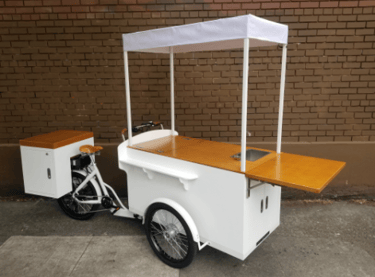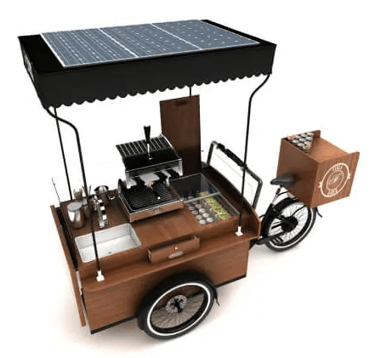To open up a physical location will most likely require taking out a loan. To take out a business loan, lenders usually want 2 years of financial history. It is hard to have 2 years of history if you can't open.
A personal loan could be taken out, but then your personal assets are mixed with the business ones. If the business fails, your assets could be taken like your house.
So, we are going to start small with a coffee cart.
What this could look like:
Reaching out to various organizations and set up at a meeting spot in town where athletes can start their activity and then finish with some coffee and hanging out. Athletes could leave some of their belonging with us while they workout and utilize a cooler if they have a post workout consumable they want to keep cold.
Being at the farmer's market for athletes to meet up after their morning workout to hangout and drink coffee
Being at local events like road races and swim meets to provide coffee during and after their race(s).
Being on UCD campus
Here is a custom 3D model based off of a couple bike cart companies offerings.




To the right are two models from two companies the we will possibly purchase a cart from. The 3D creation is based of of these. There is the "Deep Freeze" from Icicle Tricycle (left image) and the "Ferla-x" from Ferla Bikes (right image)
Initial Progress:
To get everything approved, the build and functionality of the cart needs to accommodate the SOP while falling under the guidelines of a CMFO in CA/Yolo County.
After inquiring at the county level, some new ideas have come into consideration.
All equipment in integrated into the cart. This means nothing can be brough on the cart and then set up off the cart. Ideally, the cart would have a freezer for ice and a fridge for add ins like milk. If pour over/immersion style drinks were to be made, a burner or water heater is needed that is integrated into the cart. A small stove seems more applicable and able to be "built" into the cart. Kettles draw lots of power and may not be the best item to be powered by a portable battery. We don't want to use a generator because they are unattractively loud. We say unattractively because if we use an espresso machine, they make noise but are not as loud and have a different "work" sound to them which is tolerable. So far, it doesn't seem like Ferla bikes can install a burner. We still haven't heard back from Karpitia yet.
Update: Also in communications with icicle tricycle location in the pacific north west. Quotes are similar to Ferla for similar carts.
Handwashing and ware washing sinks. This will be a big limitation/decision to make about the cart and business. The simplest version of the cart would be to make all drinks at an approved kitchen (more on this later), load up the cart with drinks and serve/dispense off of the cart with no beverage prep on the cart. This would look mostly like a cold brew cart. This would eliminate the need for sinks. However, we are interested in brew and serving drinks on the cart as a fresh, hot cup of coffee is always better. This means we will need handwashing and ware washing sinks which would take up much of the space on the cart. This also means larger water storage and waste tanks to accommodate for the cleaning of pour over and immersion brew equipment (and espresso if we go down that route). The sinks also require a swivel spigot and other features that seem like a headache. The think we need to look into that might save us is
"MFF (Mobile Food Facility) that are not required to warewashing sink are those that handle nonPHF that require no prep other than heating, baking, popping, portioning, bulk dispensing, or assembly; steamed or boiled hot dogs; and tamales in the original, inedible wrapper. All utensils & equipment must be washed and sanitized at the commissary on a daily basis and MFF must maintain an adequate supply of spare preparation and serving utensils."
We think coffee grounds just need to be "heated"...right? Than just a hand wash sink is needed because we are dealing with limited food prep on the cart. Under the handwash sink requirement section, there is a note about bulk dispensing a nonPHF beverage, but making a pour over isn't bulk. If we just carried cold brew, then we wouldn't need a sink at all.
Commissary considerations. A commissary for our definition is a county approved kitchen. Any restaurant in business is an approved kitchen. A commissary is needed for a handful of reasons for a food cart:
Prep any food sold on the cart
Fill up water tanks
Clean and sanitize equipment and utensils at the end of the day
Dispose of waste water and garbage at the end of the day
It was recommended by someone we talked to at the county that we look into partnering with a coffee shop kitchen as we would share similar equipment and work. That does sound like a great idea for practical reasons, but we are unsure if a coffee shop would want to facilitate their competition. So for now we are reaching out to other types of potential partner kitchens. A commissary is needed for any food prep. For us, this looks like grinding beans and preparing cold brew and possible drip coffee which is kept hot on the cart. However, keeping the drip brew hot might be difficult. We have reached out to "Local Kitchens" in Davis, but they indicated that space is only for partnered business who have their foods sold at the location. Maybe something for down the road. We have reached out to two breweries Sudwerk and Dunloe. Partnering with a brewer would make thematic sense and have the potential option of utilizing their nitrogen or CO2 for kegging our cold brew if we decide that is an option. We have also reached out to the Davis Co-op since they have a test kitchen across the street from their grocery store. Davis Odd Fellows was also contacted since we were notified they might be available for something like this as they have a kitchen. If those don't pan out, we might reach out to some boba place and then finally locally owned coffee shops.
Update: Dunloe doesn't have a kitchen and alcohol doesn't fall under the health department).
Update: Reached out to Mabel's Farm Box
Update: Oddfellows said their kitchen is already being rented out
Update: Reached out to Pink Dozen
Bigger update: Upon finally finding chapter 11.7 of the California Retail Food code, is appears that a Cottage Food Operation may be used as a commissary. Time to look into getting a CFO permit.
Update: Submitted CFO B application. Inspection pending. Reached out multiple times to the health department to ask about an ETA for an inspection, but no response.
Espresso and energy. In a dream world, setting up and using an espresso machine on the cart would be straight forward and easy. A commercial espresso machine requires a lot of watts to operate. A simple solution would be to run a gas powered generator, but those are loud and we are not sure if that would be considered non integral equipment. Another solution is to use a large, portable, chargeable battery. After looking into the spec of small espresso machines and various batteries...it is undetermined if it would work and even if it did work it is unknown how effective it would work day in and day out. The batteries have wattage ratings and power surge wattage ratings. Espresso machines usually operate at close to or over the power surge ratings. The batteries are probably not designed to be at this power surge rating for more than a moment like when turning on a fan. The more practical solution to having an espresso machine on a cart would be a gas powered or semi gas powered machine. The gas is responsible for heating the water and making pressure. Machines that require electricity still only need a little power draw for a water pump and electronics of the machine. Unfortunately, the only realistic option seems to be some espresso machines that only have water hook up options and not a fillable reservoir. Needing a water hook up set up just adds more parts to an already cramped space. We are still looking into solutions.
Update: Espresso machine purchased.
Main Hurdles. The main hurdles for opening a food cart in Yolo County as someone with 0 business experience and 0 food industry experience have been:
Understanding guidelines and regulations and what that looks like in practice. Even the same guidelines across different regulating organizations say slightly different things.
Obtaining information from cart builders to come up with accurate schematics to get approved by the county. The worst case scenario is going through with a cart purchase and then having the county deny the plan.
Knowing what permits and licenses to get and where to get them. Order of what permits and licenses to get (i.e. The county business license indicates you need a health permit. To get a health permit, I need the cart build and SOP to be approved. I do, however, already have the state business license).
Planning real equipment for the cart. I.e. I need a pump and battery for some plumbing on the cart. There are so many out there with different specs and requirements. knowing what choice to make is tough because you don't want to get it wrong.
Finding a commissary. I believe this is the hardest step and main block for anyone trying to start a business in this food cart space. I want to open a food cart because I can't open a physical location with kitchen because I need 2 years business records and history to get a loan, so I am starting with a cart. But the cart requires a kitchen. I am being asked to try and partner with a business in town who has a kitchen, but adding on a random start up to their space is an extra headache for them and I can't offer much as a start up in terms of partnering or money. The initial point of having a food cart was because I can't have a physical location. I need a physical kitchen that isn't even mine. It would be easier to open a food cart if one already had an established food business and wanted to expand into the food cart space. I was under the impression a food car would be easier to get into the food business because of the lower cost and management.
"On September 23, 2022, Senate Bill 972 (SB 972) was signed by the Governor and becomes effective January 1, 2023. This bill modifies the California Retail Food Code (CRFC) to relax some structural and operational requirements for lower risk sidewalk food vending operations. SB 972 created a new category of Mobile Food Facilities termed Compact Mobile Food Operation (CMFO)."
This process doesn't seem like a bar is lowered for people to open a business. However, I do not know what it was like previous so maybe this is...
The link on the CDPH to the retail food code is not updated to include chapter 11.7 Compact Mobile Food Operation.
11/3 Updates:
My initial submission of cart plans and operating procedure was rejected by the health department. They noted 5 items that needed to be addressed which mainly had to do with specification sheets for equipment and clarifying some details about the cart.
I resubmitted my plans with the updates, and they were approved!
This means I can go ahead and purchase the cart through icicletricycle which I am doing soon
I had some troubles moving money from personal accounts to my business account, but I learned some things about different methods of transfers
The espresso machine came end of October, and after getting a few parts at the hardware store, I managed to connect a water pump, propane tank and electrical cord to the machine.
I pulled some shots with grounds from our Baratza Encore, but that grinder can't grind fine enough for espresso without tinkering with it to grind finer. The water just flowed right through the grounds and resulted in bean water.
I have started looking for espresso grinders, and I came across some on craigslist. I might meet up soon with someone to get a used grinder to do some testing, and then I would look for a newer commercial grinder.
Next big steps are to still find a kitchen to partner with...
